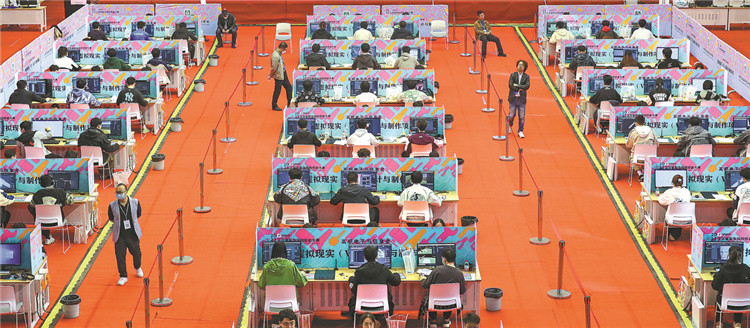Education
Setting goals

Contestants take part in a vocational skills match in Huaian, Jiangsu province, in March. The event tested their skills in building virtual reality algorithms and VR motion interaction. ZHAO QIRUI/FOR CHINA DAILY
Emphasis is being placed on vocational education, with eye on producing more skilled workers, Cheng Si reports.
China is putting effort into improving the competitiveness of vocational colleges to secure a healthier development of vocational education even as some long-standing stereotypical views of workers' skills or lower social recognition remain tough challenges for the government.
Vocational education has played an important role in the nation's education sector in the past decades, with both the number of schools and students registering seeing continuous growth.
China has two vocational education systems managed by the Ministry of Education and the Ministry of Human Resources and Social Security.
Under the system managed by the Ministry of Human Resources and Social Security, some 2,423 vocational schools offer educational training that produces workers with skill levels — low, medium and high. The students get job-qualification certificates after the competition of courses.
The Ministry of Education manages another 8,812 schools offering vocational education, among which 1,518 vocational colleges issue graduation certificates equivalent to normal universities. According to the ministry, the population of students admitted to vocational colleges that issue such certificates reached 5.53 million in 2021, roughly a twofold growth from 2011. These vocational colleges provided over 1,300 majors, covering main sectors such as manufacturing and the hotel industry, as of 2021.
Legislative action has also been taken to lift social recognition and the acceptance of vocational education in the past few years. In April 2022, the National People's Congress, the country's top legislature, approved an amendment to the vocational education law, which clarifies that vocational education has the same importance as normal higher education.
Under the newly amended law, vocational education systems now managed by the Ministry of Education and the Ministry of Human Resources and Social Security will be better connected to help the students advance their careers after graduation. Vocational education and normal higher education will also be better connected.
According to the amended law that took effect on May 1, 2022, students with vocational training from colleges managed by the Human Resources Ministry can get their job-qualification certificates "transferred to academic credits "approved by vocational schools that are run by the Education Ministry. Those who finish vocational education at institutions managed by the Education Ministry can apply for academic degrees approved by regular universities based on their performance.
Chen Kai, from the Guangzhou Institute of Educational Research, told the financial media outlet Yicai that making vocational education run parallel with normal higher education means the country "will smoothen the promotion channel for vocational students".

Copyright 1995 - . All rights reserved. The content (including but not limited to text, photo, multimedia information, etc) published in this site belongs to China Daily Information Co (CDIC). Without written authorization from CDIC, such content shall not be republished or used in any form. Note: Browsers with 1024*768 or higher resolution are suggested for this site.
Registration Number: 130349









